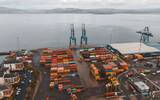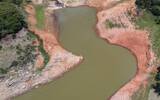What coffee producing areas are there in central and western Kenya? What are the characteristics?
African coffee is well-known in the global coffee market. Coffee is mainly grown in East Africa, which is the highest-lying region in Africa. Because it is run from north to south by the East African Rift Valley, it brings many mountains, volcanoes, lava plateaus and lakes along the route. It is rich in natural resources, so there are many well-known coffee-producing countries such as Ethiopia, the recognized birthplace of coffee. Kenya is famous for its multi-layered tastes and juicy acidity.
Kenya is located in tropical monsoon areas with cross-equator and diverse climates. most areas belong to savanna climate, hot and humid coastal areas, mild climate on the plateau, perennial snow cover in mountains above 3500 meters, and annual temperature between 12-24 ℃. Due to the influence of monsoon climate, there are only rainy season and dry season. High-altitude mountains, volcanic soil, plenty of sunshine and appropriate rainfall provide ideal conditions for coffee growth.
Coffee is mainly grown in southwest and south-central Kenya and is roughly divided into three regions: the central region of Kenya, the Great Rift Valley region of East Africa and the western region. In the western region, there are three major producing areas, Mt.Elgon, Transit-Enzoya Trans-Nzoia and Bangma Bungoma, which are mainly concentrated at the eastern foot of the Elgon volcano, while the East African Rift Valley is mainly Nakuru Nakuru and Kisi Kisi, which is located in the central and western part of the country. The main coffee producing area is the central region, which produces 60% of the country's coffee, mainly Neri Nyeri, Kiambu Kiambu, Kirin Yajia Kirinyaga, Mulanga Murang'an and Sika Thika, which are basically around the Kenya volcano.
The most famous producing areas in Kenya are Neri Nyeri, Kirin Yajia Kirinyaga and Sika Thika. Thanks to the extinct volcano here, Mount Kenya, located at the equator, is the second highest peak in Africa, with an elevation of 5199 meters. Usually smoky, the peak is looming, the top of the mountain is covered with snow all the year round, and there are 15 glaciers, growing coffee, bananas and other crops on the fertile soil brought by volcanic ash in dense forests and plantations more than 1500-3500 meters above sea level.
Front Street Coffee Asalia Coffee beans from Kenya (Kenya) south of the Sika Thika producing area, the selection of common Kenyan coffee varieties SL28 and SL34, using K72 washing treatment, brewing will smell ripe tomatoes and flowers, entrance will have virgin fruit and Wumei flavor, bright sour, sweet, juicy, clean taste.

In addition, there is also a good performance in the coffee producing areas of central and western Kenya, where the main coffee producing areas are Nakuru Nakuru and Kisi Kisi, both located around the East African Rift Valley. Among them, Nakuru Nakuru producing area is located in Nakuru, the capital of Rift Valley Province, and is the fourth largest city in Kenya, near the Menangai crater (Menengai Crater).
It is rich in natural resources, including not only the Menangai Crater (Menengai Crater), but also the famous Nakuru National Park (NAKURU), which is famous for Lake Nakuru and flamingos. However, the city developed relatively late and began to rise as an important station of the Mombasa-Uganda railway in 1900.
At first, corn and animal husbandry were mainly grown here, then coffee was gradually grown, and it has also become one of the higher altitude growing areas in Kenya, where coffee is grown in an area between 1850 and 2200 meters, producing coffee with medium acidity, full fruit aroma and rich chocolate flavor. At present, it has also become a distribution center for livestock products, coffee and tea, as well as agricultural products processing, wool spinning, tanning, wood processing and other industries.
Kenyan coffee has always been loved by coffee lovers because of its distinctive and complex sour aroma of berries, sweetness of sugarcane and juicy acidity. The main varieties of coffee grown in Kenya are SL28 and SL34. SL is an acronym for Scott Agricultural Laboratory Scott Laborotary, but it is now the Kenyan National Agricultural Research Laboratory NARL (National Agricultural Laboratories).
At the beginning, Scott Agricultural Lab studied the yield, quality, drought resistance and disease resistance of 42 coffee trees from different habitats. All the selected coffee species were prefixed with SL, and SL28 and SL34 were one of the superior varieties.
Although both SL28 and SL34 have the characteristics of high yield, easy to grow and suitable for growing at medium and high elevations, they are both vulnerable to insect pests and coffee diseases. In addition, because of their unique flavor, SL varieties grown in Kenya are famous for their significant citrus, berry and black plum flavors, high sweetness, bright and rich fruit acidity, and full-bodied taste. Varieties such as K7 and Ruiru 11 will also be grown in Kenya, but SL28 and SL34 are more popular because they are more unique and rich in flavor.
For more information about coffee producing areas, please scan the code directly and follow: coffee comments.
Long press the QR code to follow:
Important Notice :
前街咖啡 FrontStreet Coffee has moved to new addredd:
FrontStreet Coffee Address: 315,Donghua East Road,GuangZhou
Tel:020 38364473
- Prev

Vietnam has been hit by continuous storms! Severe delay in coffee exports at port
According to the Ministry of Agriculture and Rural Development of Vietnam, after Tropical Storm "Suri" made landfall in central Vietnam on September 19, it injured one person, damaged 93 houses, damaged two schools, and caused 13 landslides., resulting in the inundation of many roads and seriously affecting many industries in Vietnam. According to reports, tropical winds
- Next

Brazil's drought will last until 2025! The coffee industry was severely damaged
According to Brazilian media reports, in recent times, Brazil has experienced severe drought, resulting in frequent forest fires in Brazil, with serious impact. However, in recent days, a cold peak has formed in the south, which has temporarily alleviated the dry and hot weather in southern Brazil. However, the current cold peak is weakening and temperatures are rising again. currently
Related
- What grade does Jamaica Blue Mountain No. 1 coffee belong to and how to drink it better? What is the highest grade of Blue Mountain coffee for coffee aristocrats?
- What are the flavor characteristics of the world-famous coffee Blue Mountain No. 1 Golden Mantelin? What are the characteristics of deep-roasted bitter coffee?
- Can I make coffee a second time in an Italian hand-brewed mocha pot? Why can't coffee be brewed several times like tea leaves?
- Hand-brewed coffee flows with a knife and a tornado. How to brew it? What is the proportion of grinding water and water temperature divided into?
- What is the difference between Indonesian Sumatra Mantinin coffee and gold Mantinin? How to distinguish between real and fake golden Mantelin coffee?
- What does bypass mean in coffee? Why can hand-brewed coffee and water make it better?
- Unexpected! Ruixing Telunsu lattes use a smoothie machine to foam milk?!
- % Arabia's first store in Henan opens into the village?! Netizen: Thought it was P's
- Does an authentic standard mocha coffee recipe use chocolate sauce or powder? Mocha Latte/Dirty Coffee/Salty Mocha Coffee Recipe Share!
- What is the difference between Vietnam egg coffee and Norway egg coffee? Hand-brewed single product coffee filter paper filter cloth filter flat solution!

